Regular hand washing helps remove dirt, organic and inorganic debris and microorganisms that can lodge in them and promote disease. This helps to prevent the transmission of waste or harmful organisms, however, it can make it difficult for you to take care of the skin on your hands.
This habit must be performed optimally to ensure results, including wetting, lathering, scrubbing all areas, rinsing, and drying in a clean environment. In this way you will help prevent the contagion and spread of various diseases , such as COVID-19.
However, despite its benefits, this practice can frequently cause the skin on the hands to dry out or crack , which causes discomfort in the person who suffers from this condition, and forces them to look for alternatives, such as using water warm or special moisturizers that allow you to preserve your health without being vulnerable to disease.
Learn how to keep the skin on your hands healthy and avoid adverse effects by washing them frequently.

6 recommendations to keep your hands clean and healthy
1. Use warm water
Experts such as Dr. Daniela Kroshinsky, director of dermatology at Massachusetts Hospital, recommend that hand washing be done for a minimum time of 20 seconds, using soap and warm water. It also recommends that the estimated washing time should be approximated to the employee to sing "happy birthday" twice. The person should be sure to treat all areas of the hands, including palms, backs, fingers, between fingers, wrists, and nails.
For its part, the World Health Organization (WHO) recommends that the estimated time be at least 40 to 60 seconds to guarantee effective results and prevent the permanence of microorganisms.
Similarly, both Kroshinsky and the dermatology specialist and founder of the London Premier Laser and Skin Clinics, Lucy Xu, agree that using hot water in washing hands will cause them to dry out and crack due to the elimination of natural oils that protect from external factors such as water. Therefore, when you wash them, it is advisable to use warm water or at room temperature, this will give you good results and will not damage your skin.
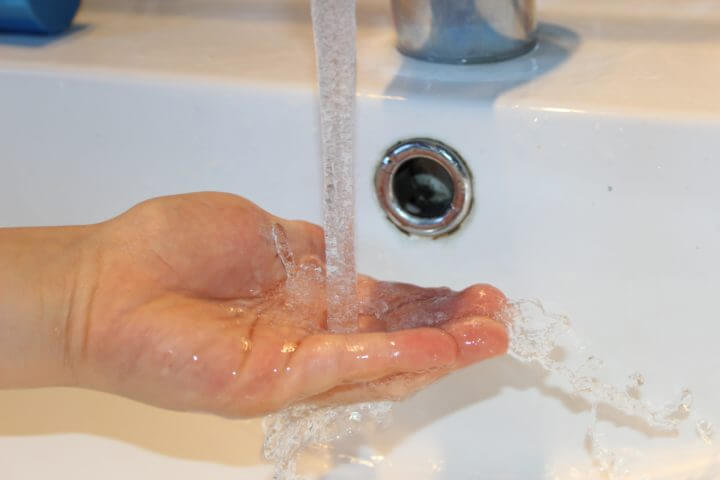
2. Use mild soaps with moisturizing properties
Many commercially available handwashing products can have strong active ingredients that damage the skin, causing it to dry out, crack, or begin to peel.
Dermatologist experts such as Xu and Renée Rouleau recommend using soaps with a creamy consistency , made with glycerin and lanolin, and avoiding bar soaps , since they have binders with a high pH to maintain their solid consistency, which generate dry skin.
For hand washing, you should look for soaps that are not aggressive or have strong ingredients for the skin. In general, liquid soaps are friendlier and do not cause as much damage to the hands.
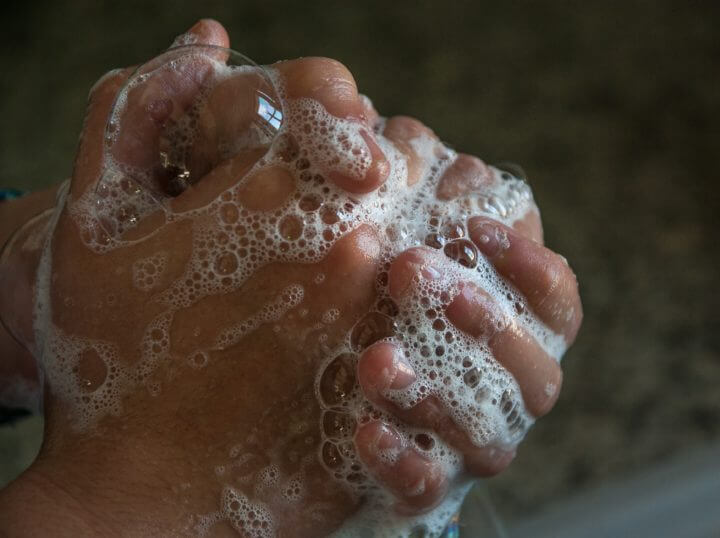
3. Use nourishing and moisturizing ointments.
After washing your hands, if you do not remove the remaining water used, it can cause dry skin. This is because, according to Rouleau, the water from the surface will attract the water that is in the inner layers of the skin, evaporating it and generating dehydration.
For this reason, both Rouleau and Adam Friedman, doctor and professor of dermatology at the George Washington School of Medicine and Health Sciences , agree that moisturizers should be applied to the hands after each wash.
As they point out, it is preferable to use thick creams or ointments instead of lotions to take care of the skin on your hands. The latter have a high content of liquids that promote the loss of liquids in the skin. The less water in the cream, the better protective effects it will have on the hands.
Dr. Friedman states that moisturizing creams or ointments promote the restoration of the protective ability of the epidermis , helping to provide a layer of protection, improve appearance and increase the water content in the skin.
These creams or ointments should be applied periodically, mainly when you wash your hands, perform any activity that can dry out the skin (such as exposure to high temperatures), before going to bed to sleep and when you feel that your hands are drying or cracking .
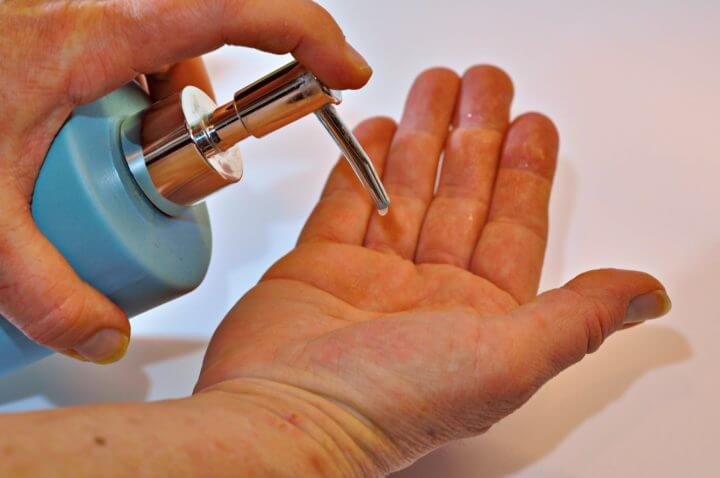
4. Wear gloves to avoid dehydration of the hands
Dr. Friedman recommends that special treatments be applied frequently to hydrate the skin . For example, soak your hands in a container for at least 5 minutes, then apply a moisturizer and gloves for 1 to 2 hours. This will help you prevent the evaporation of water from the inner layers of the skin and promote the absorption of nutrients.
For her part, Dr. Xu recommends moistening your hands with an ointment or thick cream every night and wearing cotton gloves to prevent the loss of water on the skin, allowing it to stay moist during the rest time, which is normally between 6 and 8 hours.
Wearing gloves can also help protect your hands from external factors that can damage the skin, such as excessive changes in temperature, tears, or the action of strong chemicals.
We leave you the best offers of moisturizing hand creams
5. Use mild disinfectants as a substitute for soap
On many occasions the skin is so affected by cracks or dryness that they cause discomfort when trying to wash them with soap and water , so it will be necessary to temporarily use a special disinfectant to clean the hands without dehydrating them.
Kroshinsky states that The disinfectant is a useful alternative to keep hands clean and avoid the permanence of microorganisms or residues; however, it is not recommended to use it before eating, handling food or kitchen utensils, after using the bathroom or when they are extremely dirty. In those cases, it indicates that it will be necessary to wash your hands with soap and water.
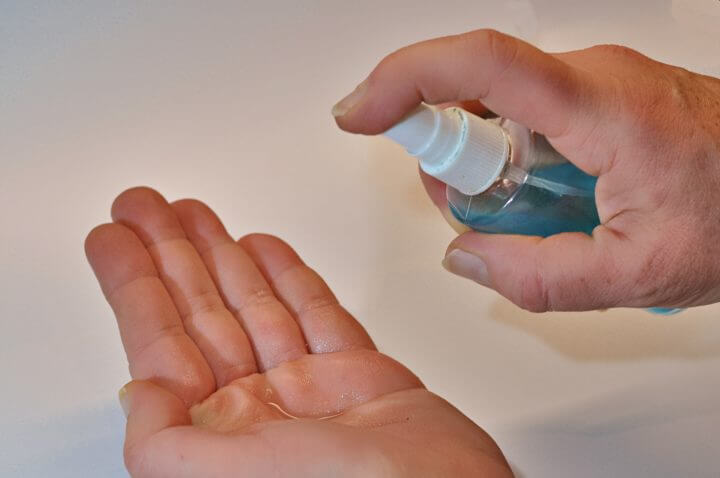
6. Use friendly hand drying products
After washing the hands, it will be necessary to remove the rest of the excess water to avoid evaporation and dehydration of the skin on the hands; However, if it is done with rustic materials or in a violent way, it can cause damage to the surface.
Rouleau recommends using paper towels or soft personal cloth towels for drying hands, which should be replaced in periods of up to 3 days, to avoid the proliferation and transfer of microorganisms in these humid environments and to take care of the skin on your hands.
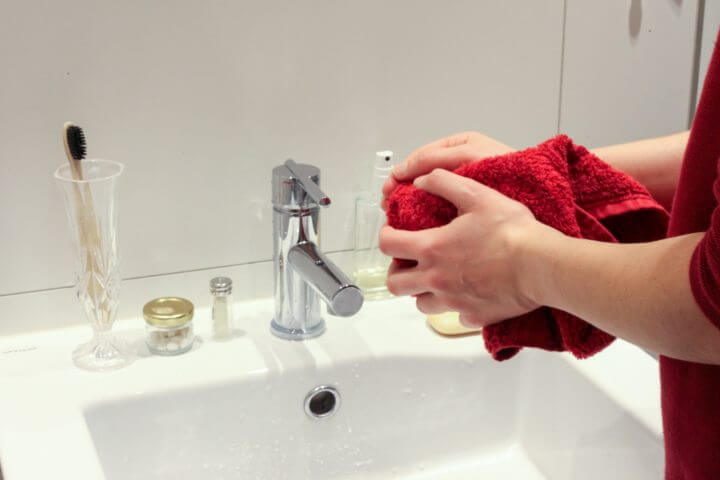
Recommendations for hand washing
WHO recommends following a series of steps to ensure effective hand washing , take care of the skin on your hands, and successfully remove all dirt or microorganisms they may have. To do this, follow these steps sequentially:
- Wet your hands with clean warm water.
- Rub your hands with mild soap for at least 20 seconds, making sure to cover areas such as palms, between fingers, toes, backs of hands, and nails.
- Make sure to remove dirt on fingers, wrists, and nail surfaces.
- Wipe the soap off your hands with clean warm water.
- If the faucet does not turn off automatically, do so with a single-use paper towel or clean the surface with soap during the hand washing process.
- Dry your hands with a clean dry cloth towel or single-use paper towels.
Repeat this procedure every time you wash your hands, trying to use between 40 and 60 seconds to guarantee the desired results.
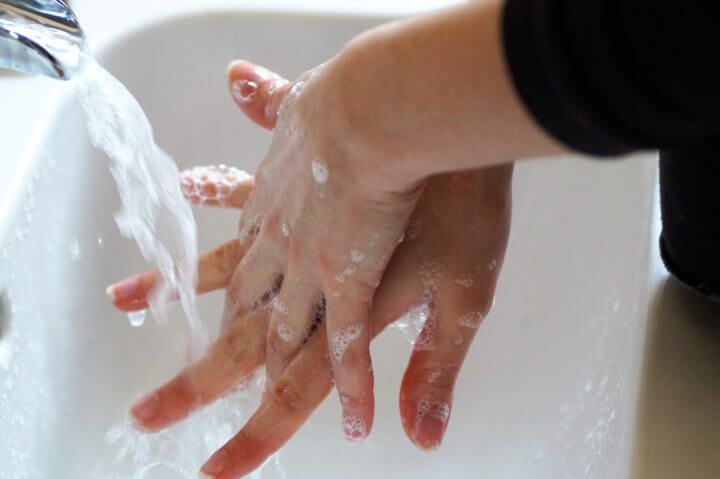
conclusion
Hand washing is a habit that helps preserve people's health by reducing contact with waste or microorganisms that can be transmitted and cause disease. However, when done too frequently it can lead to dehydration and cracking of the skin , which can lead to discomfort.
To avoid these adverse effects and take care of the skin on your hands, try washing them with warm water , mild soaps (preferably liquid) and drying them with a clean cloth or disposable paper towel (not to be used for more than three consecutive days).
Similarly, periodically perform hydration treatments on your hands and use special creams or ointments. That will help you keep your skin protected and healthy.
References
- Cassata, C. (2020). 7 Tips to Keep Your Skin Healthy While Washing Your Hands Often. For Healthline. [Revised March 2020].
- World Health Organization. Hand hygiene: why, how, when? [Revised March 2020].
- Wang, Z. (2020). The coronavirus prevention handbook: 101 science baser tips that could save your life. Skyhorse Publishing , 1 (1).